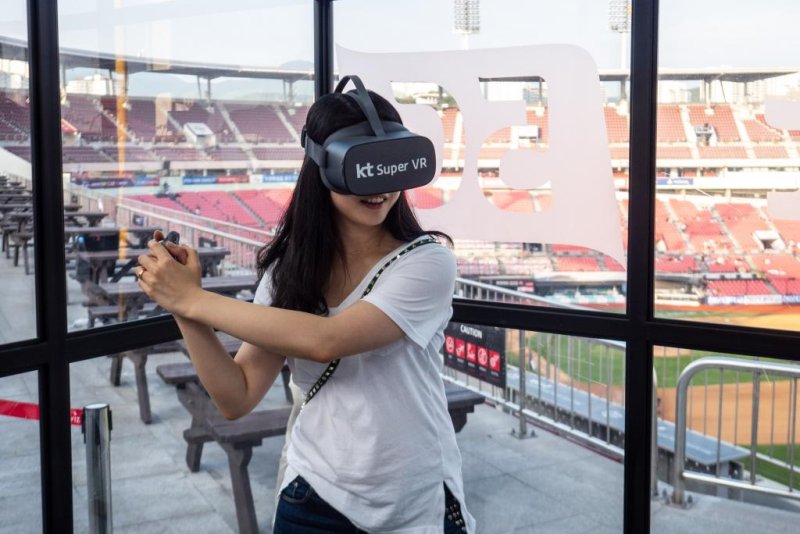1 of 8 | A fan plays a 5G-powered virtual baseball game at KT Wiz Park in Suwon, South Korea on Thursday. The ballpark is being billed as the world's first 5G stadium and features a host of high-tech features for fans. Photo by Thomas Maresca/UPI
SUWON, South Korea, Aug. 30 (UPI) -- South Korea has been a global leader in rolling out ultra-fast 5G wireless networks, but real-world applications that take advantage of the blazing speed of the new technology, which can transfer data up to 20 times faster than 4G, have remained scarce.
For baseball fans in Suwon, about 20 miles south of Seoul, however, a trip to the ballpark is a now a chance to experience a high-tech showcase of all that 5G has to offer.
Suwon's home team is the KT Wiz, owned by Korean telecom giant KT, and execs are billing their ballpark as the world's first 5G stadium.
KT Wiz Park has been fitted with cutting-edge tech that allows fans to use their smartphones to stream video from multiple angles, access reams of real-time data and even order food to be delivered directly to their seats.
KT, which tested 5G technology during the bobsleigh and figure-skating competitions at the 2018 Winter Olympics in Pyeongchang, is planning to expand the system to the nine other teams of the professional Korean Baseball Organization League.
"We are going to provide ultra-fast, immersive services at all ballparks throughout the country," Lee Pil-jae, a KT senior executive vice president, said in a statement.
In Suwon, KT has installed 40 high-definition and seven ultra-high-definition cameras around the stadium. Fans with the team's smartphone app and a 5G connection can zoom in on the action in real time and rotate around a 270-degree field of vision, in a "wow" function called Matrix View, or focus in on different areas of the field or stands.
Statistical data is instantly accessible, such as the speed and spin rate of each pitch, which is tracked through three cameras and processed with special motion-tracking software. Fans can also have Korea's favorite ballpark snacks, fried chicken and beer, delivered directly to their seat with the click of an on-screen button.
While baseball purists might balk at the new developments, in Korea the game is not the same old-fashioned pastime as it is in the United States. A night at KT Wiz Park is a high-energy affair, with cheerleaders and a steady stream of music punctuated by fan rally songs and choreographed chants welcoming every batter by name.
The smartphone app, which can be used to view the game from anywhere, also hasn't kept fans from coming out to the stadium. In fact, KT executives say that the 5G experience has increased live attendance.
"Attendance has gone up 10 percent this season," Han Woo-je, assistant marketing manager for the KT Wiz, told UPI. "The app and 5G technology are not only enjoyed by the original fans but are also attracting new fans."
Some 250,000 users have downloaded the KT Wiz app, according to Han, with 5,000 to 10,000 using it during games from inside and outside the stadium.
Beyond the smartphone app, 5G technology has become part of the overall fan experience. Kiosks in the upper deck of the stadium allow fans to sample other 5G-powered services, such as a virtual reality baseball video game, while a 5G-equipped robot vendor serves up soft drinks and ice cream.
The technology is also serving up user data to KT on everyone who uses the app, which the company says it is using for membership marketing purposes such as ticket giveaways and other promotions.
Inside the stadium, a control center tracks everything from concession sales to crowd congestion at the entrance gates. Even the air quality at the ballpark is monitored, and if fine dust levels are too high, sprinklers will release artificial rain.
South Korea became the first country in the world to commercially roll out 5G in early April, and adoption has been fast as Korean brands such as Samsung and LG race to bring 5G-equipped smartphones to the market.
Earlier this month, South Korea surpassed 2 million 5G subscribers, a pace that has exceeded industry expectations. SK Telecom leads the pack with over 1 million subscribers, while KT, which is the largest overall telephone company, has 750,000 subscribers as of August.
South Korea is banking on 5G as a pillar of its future growth and as a way to kickstart an economy whose once explosive growth has matured, by spurring new industries from autonomous driving to digital healthcare.
"The new 5G-based industrial ecosystem will provide opportunities for our youths to take on new challenges and for the nation to see a second venture boom," South Korean President Moon Jae-in said in April.
Moon announced goals of capturing 15 percent of the global 5G market, generating 600,000 quality jobs and achieving $73 billion in exports by 2026. The government has pledged to invest some $26 billion to ensure total nationwide 5G coverage by 2022.
For now, the ballpark may be the best place to catch a glimpse of the 5G future.















